Welcome to ED
Wanju wanju, nidja
We acknowledge the Whadjuk people of Noongar nation, traditional custodians of the land on which we work and we pay our respect to Elders past and present.
Perth Children’s Hospital is also called PCH. Emergency Department is also called ED.
We are here to help your child get the care they need.
We care for children aged 15 or under with medical or mental health emergencies. It is free for Australian citizens or residents.
This can be extended to the age of 18, if they have a pre-existing medical condition which they still get care for at PCH and they come to ED for a similar condition.
Languages available
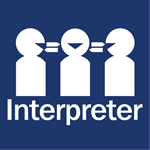
Ask for an interpreter if you don't understand or to help you speak with us. The service is free and available 24 hours a day, seven days a week.
Find out more about the PCH Interpreter Service and how to request assistance
Waiting times
It can be busy in the Emergency Department with lots of sick children waiting to be seen. The sickest children are seen first. The order and waiting times are the same if you arrive by ambulance. You can check the current maximum wait time on screens in the waiting rooms.
Please tell us if you plan to leave before we have treated your child.
What happens in the Emergency Department

Triage
Triage helps staff decide how quickly your child needs to be seen by a doctor. They will check your child and ask you some questions.
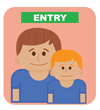
Entering the Emergency Department
You and your child will then go inside the Emergency Department to a cubicle or a waiting room. A clerk will ask you some questions. There may be a wait before being seen by a doctor. Please let us know if you are worried your child is getting worse.
While you wait, if you can, think about your answers to the following questions.
| Why has your child come to hospital today? |
- How long has this been going on? What do you think caused it? Have they had this before?
- Are they in pain?
- Have they been eating/drinking/going to the toilet?
- Have you seen another health practitioner for this problem?
- Has someone else told you to come to ED?
- Have any tests or x rays been done before coming into ED?
|
| What is your child's medical history? |
- Are they currently receiving care from a health professional? (This also includes mental health)
- What other conditions or illnesses do they currently have? (For babies, staff may ask about the birth)
- What conditions, illnesses or surgeries have they previously had?
- Are their vaccinations up to date?
- Is there any family history of conditions or illnesses you would like to share with us?
|
| What medications is your child taking? |
- What medications have they taken over the past few days (including antibiotics)?
- What is the medication name, dose and how often are they taking it?
- What supplements, vitamins, or herbs has your child taken today, or takes regularly?
- Have they recently stopped taking any medicines?
|
| What allergies does your child have? |
- This includes reactions to food, medication, stings, and materials such as latex or dressings (these can be confirmed or suspected).
|
| Is there anything else you think we should know? |
- Has your child suffered any trauma related to their medical care or treatment?
- Do you or your child have any cultural, social, language, family or behavioural needs?
- When was the last time your child had something to eat or drink?
|
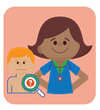
Seen by the nurse, nurse practitioner or doctor
They will ask questions and check your child to help understand what is wrong.
You can ask to speak to the doctor away from your child.
Adolescents can ask to speak to the doctor/nurse practitioner/nurse away from their parent.
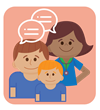
Talk with your nurse, nurse practitioner or doctor
The doctor, nurse practitioner or nurse will explain what is wrong and what your child needs.
Ask us questions at any time.
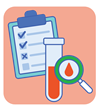
Tests and treatment
Your child might need a blood test, x-ray, or some other tests to find out what is wrong. They may also receive treatment while in the ED. You may need to wait for the test results or to see how your child responds to treatment.
Social stories
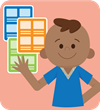
Please see the links below for information about procedures that commonly take place during a visit to the ED.
These simple step by step explanations can be used to prepare your child before a procedure to help them become familiar with the steps involved, reducing anxiety.
These social stories have been developed for children with neurodiversity, however they can be a useful tool for preparing all children for an ED procedure.
Visit the social stories library for a complete list of these resources.
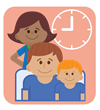
Going home or being admitted to hospital
Depending on your child’s condition, you will either be able to go home, stay longer so your doctor can observe your child, or be admitted to hospital.
Going home
When your child is ready to go home, the doctor, nurse practitioner or nurse will give you some information about what you need to do to care for your child, which may include an information sheet on your child’s condition and a letter for your local doctor. If you or your child need a medical certificate, please tell your doctor, nurse practitioner or nurse before you leave. Ask us any questions you may have.
When you are at home, please follow any instructions given to you by the doctor. If you are worried that your child is not getting better, you can:
Being admitted to hospital
Your child may be admitted to hospital for further tests and/or treatment under the Emergency team or a specialist doctor. Our aim is to provide care closer to your home, so we may transfer your child to a children’s ward at your local hospital for treatment or have Hospital in the Home (HiTH) nurses visit you to provide care and check on your child.
If you need to stay at Perth Children’s Hospital you may be moved to our Emergency Short Stay Unit (ESSU) or a hospital ward.
If your child is admitted to ESSU, they will remain under the care of the Emergency team. If your child needs more treatment or surgery, they will be admitted to a hospital ward.
Meet your healthcare team
There are lots of people who help care for your child.


We have an Aboriginal Health Worker available most weekdays who will help to provide care within ED. Please ask if you would like to see them.
If you think your child is in pain
Please talk to a nurse who will assess your child and organise appropriate pain relief.
Are you worried your child is getting worse? We need to know
If your child seems sicker or is behaving unusually, tell us right away. You know your child best. We will listen to you.

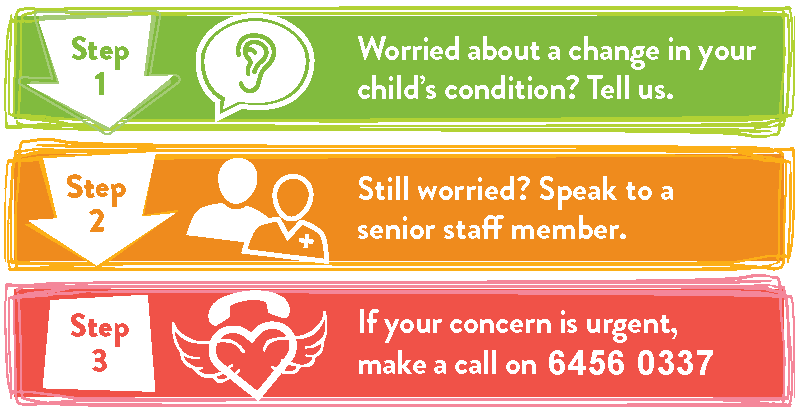
If your English is limited say ‘Emergency Waiting Room’ or your room number.
Where are the...
Toilets
- An accessible toilet is located just inside the ED, to the left of the entrance
- Towards the back of the ED, next to Pod C waiting room, behind the Beverage bar
Please follow the signage or ask a staff member if you are unsure.
Parenting room
- A changing table is located inside ED, next to the accessible toilet, behind the blue curtain
- A second change table is in one of the bathrooms near Pod C
Drink fountains
Water is available in the Beverage Bay near the Pod C waiting area.
Food and drink
- Free tea and coffee facilities are located at the Beverage Bay inside ED near the Pod C waiting area
- Vending machines are located behind the triage area within ED
- Little Lion Cafe is near the main entrance on Ground Level
- The Food Hall is located on Level 1, accessible via the Pink lifts or the stairs outside Little Lion Cafe on Ground Level
- A small convenience store, Xpress Zone, is located on the Ground floor of the QEII multideck carpark and is open Monday to Saturday, 7am to 8pm.
Public payphones
Located outside ED in the corridor that connects ED to the hospital.
ATM
Located outside ED in the corridor that connects ED to the hospital.
Safety and security
Your safety and security are of great importance to us. If you see any behaviour that you are concerned about, or you feel may impact on you or your child’s safety, please contact a staff member or PCH Security on 6456 3003 immediately.
Zero tolerance for abuse
To ensure everyone's safety, we have zero tolerance policy for abuse and aggression.
Anyone who is physically or verbally abusive or aggressive will be asked to leave immediately and security will be called if necessary.
Taking photos or filming
For the privacy and confidentiality of our patients, families, carers and staff, please do not take photos or film while you are at PCH.
Compliments and complaints
Your feedback, both positive and negative, helps us provide you and your child with a better service.
After your visit to ED, you will be sent a text to ask for your feedback through the MyVisit survey. Please complete this short survey to let us know about your experience. You can also leave us a compliment or complaint via our website.